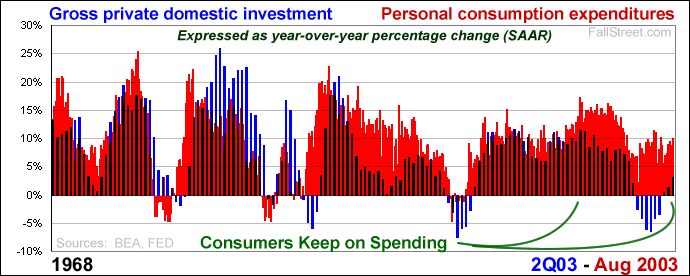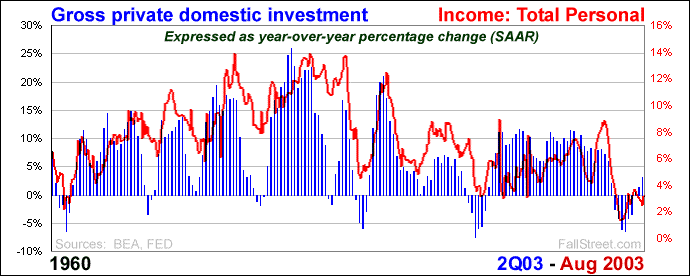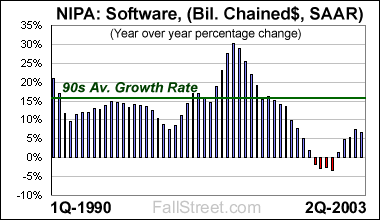October 13, 2003
E-Season Dreaming
The lower dollar is wonderful news, and layoffs/cost cuts are buttressing corporate America’s bottom line. Do you get a warm fuzzy feeling that this e-season will be great?
In an article published more than 2-years ago - “There's just no accounting for tech earnings” - USA Today highlighted how some companies get away with not expensing stock options. Also in the article, Bill Parish noted how the tax credits received on stock option can vanish when options go underwater (with stock prices rallying the exact opposite concern is prevalent today - or that the tax credits from exercised options are padding cash from operations). Not unlike Warren Buffett’s attack on manipulated earnings in the late 1990s, the USAT article in question aimed to expose corporate mischief before the likes of Enron came along. For the investor that wasn’t convinced that a company beating managed operational earnings estimates meant much of anything, these types of articles were a breath of fresh air.
Flash-forward to today – the knowledge of all the Enron’s and Wall Street’s seemly relationships with corporate America supposedly having been exposed and absorbed by the investing public – and CNN/Money tells us about the “Eight earnings reports that matter” this week. For the investor that wants to trade these stocks perhaps the info provided is sufficient. Moreover, the CNN authors do a good job of telling the investor about their economic/industry speculations. Nevertheless, what is not mentioned at all is the topic of stock options, cash flows, etc. Rather, what is repeatedly treated as the gospel is operational earnings.
Perhaps the CNN article serves a purpose to the investor that knows basically nothing about the companies they own, and to those who want the latest speculations from some people that read the newspapers. Perhaps also the media believes that in order to cover the markets they need to try and understand what managers that trade from minute to minute are looking at. Regardless, as the 1990s mania is reborn the rejuvenated term making the rounds is ‘better-than-expected”…
On Earnings: “For investors, the question is whether better-than-expected earnings already have been priced into the market. We're about to find out.”
-- (my comment) Are ‘investors’ really concerned about this whatsoever?
On Johnson & Johnson: “J&J's second-quarter earnings came in better than expected and showed a rise from a year earlier, excluding one-time charges due to acquisition-related costs…If the dollar's weakness did in fact help (this quarter), that would be an encouraging sign for the earnings of other multinationals.”
-- Speculation about managed earnings (excluding certain one-time charges), and speculation about J&J giving a boost to some other unnamed multinationals. Are the benefits/costs associated with currency translations permanent?
-- On Bank of America: “Business loan growth wouldn't be just a good sign for Bank of America; it would be a good sign for the American economy. If businesses are willing take on new loans, that would be a sign that they are becoming less risk averse. If that's the case, they might even start hiring back workers.”
-- Whoa! I can’t wait to see if BofA’s earnings report tells me that Corporate America is about to go on a hiring spree. My fingers are crossed and my mouse is hovering over the word ‘buy’!?
On Intel: “Like many technology stocks, Intel now faces concerns about valuation…if Intel is slightly more optimistic during its conference call about the fourth quarter and beyond, that would be very good news for the tech sector and could provide further fuel for the group's explosive rally...a muted outlook could cause momentum investors to cash in their chips.”
-- The best of both worlds – we now know that value investor’s are worried, and what ‘momentum’ investors are thinking. This type of insight is indispensable!
Perhaps I am nitpicking. After all, the authors do provide a basic/informative overview of GM and IBM’s upcoming releases, and the article is not nearly as biased as much of the trite that was thrown around a couple of years ago. Nevertheless, what is lost in this type of discussion is the truth behind the financial numbers being reported. Put frankly, the investor should get more excited about 10-Q season – when most companies send GAAP documents to the SEC – than they do about ‘earnings season’.
In short, unlike the breath of fresh air provided by Buffett and various others in the past, coverage of specific stocks around earnings season once again stinks. Company ABC beats estimates by two cents so company ABC rallies by 5% -- that is all you need to know to buy.
This Week
Along with the barrage of ‘earnings’ reports due out this week, an onslaught of economic reports are on tap - including retail sales (Sept), industrial production (Sept), and the Philadelphia Fed (Oct). One perception still being tossed around is that the weak jobs market continues to put pressure on consumer confidence. Such is why one of the most watched reports this week will be Friday’s consumer sentiment report (the first major confidence reading for October). Despite all the exuberance in the markets, consumers (as per the conference board estimates) are less confident about their ‘present situation’ today than they were year ago. Moreover, consumer ‘expectations’ in September stood at 88.4 – or the exact same level they were at in October 2002. Point being, all the interest rate and tax rebates to date have not helped create a more confident consumer. If confidence does not soon rebound this could have implications on what businesses do next.
Will Companies Spend?
In order for the U.S. economy to embark upon a sustainable recovery capital spending (business investment) needs to take some of the pressure off of the tired U.S. consumer (or so the story goes). To help facilitate this much needed transition in spending, Bush and Greenspan have done everything possible (save giving dividend tax breaks to the consumer instead of rich investors). Signals have emerged – both in 2Q03 GDP results, surveys, and from specific technology stock outlooks (INTC) - that business spending may pick-up. yet these signals are not as noteworthy as the 2004 spending forecasts corporate America will provide shareholders over the next two quarters.
Some Charts to Ponder
Without exception, a slow down – indeed, a contraction – in consumer spending has marked year over year declines in business investment. The reason why this occurs is self-evident: as consumers tighten their purse-strings businesses find less of a need to add capacity/increase capital investment. However, and as the chart below highlights, the current recession and slow down in capital spending has not been brought about by a decrease in consumer spending. Rather, and for the first time on record (at least as far as the BEA’s records go), the consumer has continually increased their year over year spending before, during, and after recession.
 |
As remarkable as this factoid is, even more remarkable is the fact that personal income has softened even as spending has kept up a brisk pace. Is the nearly ‘tapped out’ consumer that is also earning increasingly less money a deadly situation?
 |
But alas, worries over the consumer’s ability to spend grow tiresome, so these types of charts are ignored as others are applauded – namely the rebound in tech spending that somehow justifies the sharp rise in valuations across techland.
 |
Suffice it to say, the economic rebound is upon us, and businesses are spending more than they did last year -- this ‘better-than-expected’ news has helped stocks rally. However, it is not likely that businesses will find a reason to spend more capital in the near term (2004) unless the consumer can – somehow/someway – find the borrowing capacity to make X-mas spending season memorable (remember that X-mas season, unlike back to school season, will not bring with it tax rebates).
Just because consumers have proven the naysayers wrong for an extremely long period of time – the consumer led recession has been as popular a forecast as the ‘dollar must weaken’ argument - that doesn’t mean the threat has gone away. On the contrary, consumer leveraging during the last 3-years simple means the consumer led recession has become more inevitable.
One day stock options will be expensed, investors will pay attention to cash flows instead of operational earnings, and consumers will lead the U.S. economy into recession. While it is obvious that these days are not upon us - as stocks trade inside of a mania and consumers continue to borrow - rest assured that they will be.
With this in mind, the e-season dream seems to be that ‘better-than-expected’ earnings will continue to fuel the stock markets and that rising stock prices themselves (i.e. the ‘wealth effect’) will provide enough incentive for consumers to keep spending. To be sure, rarely have consumers been blessed with declining interest rates for such a long period of time…accordingly, rarer still is the silly notion that the U.S. economy, the shape that it is in, will be running in fine order if interest rates rise.
|
a